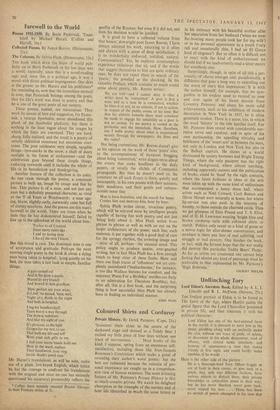Coloured Shirts and Corduroy
Private History. By Derek Patmore. (Cape, 21s.) 'STANDING there alone in the centre of the darkened stage and dressed as a Teddy Bear I recited my little piece of four lines without one trace of nervousness. . . .' Most books of the kind, I suppose, spring from an enormous self- satisfaction, including those like Jean-Jacques Rousseau's Confessions which make a point of revealing their author's worst points: but thc best are redeemed because the minutiie of per- sonal experience are caught up in a comprehen- sive view of human existence. The most irritating feature of Mr. Patmore's Private History is that so much remains. private. We watch his delighted absorption in the triumphs of the nursery and of later life (described in much the same terms) or in his intimacy with his beautiful mother after her separation from her husband ('when we went flat-hunting many people took her for my wife') or in his personal appearance as a youth ('very tall and unnaturally thin, I had an El Greco kind of elegance'). But so often it is difficult not to react with the kind of embarrassment we should feel if we inadvertently read a letter meant for somebody else.
Surprisingly, though, in spite of all this a per- sonality of charm emerges and, paradoxically, a diffidence that goes a long way to cancelling out the worst of one's first impressions. It is with the author himself, for example, that we sym- pathise in his evident need to remind us over and over again of his lineal descent from Coventry Patmore; and about his more solid achievements, such as his exhibition of modern decoration in New York in 1935, he is often genuinely modest. There is a sense, too, in which the word 'history' in the title justifies itself. For Mr. Patmore does reveal with considerable nar- rative verve and candour, and in spite of his own partisanship, the appalling triviality and brittleness of the 'smart sets' in between the wars, not only in London and New York but also in the Balkan capitals. He shows us a world dominated by society hostesses and Bright Young Things, where the only passport was the right kind of background, where almost anything, including apparently careers and the publication of books, could be 'fixed' by the right contacts, where the latest fashions in ideas or the arts were taken up with the same kind of enthusiasm that accompanied a fancy dress ball, where artists such as NoUl Coward, Cecil Beaton and Oliver Messel were naturally at home, but where lip-service was also paid, in the interests of novelty, to those outside the charmed circle. Thus we get glimpses of Ezra Pound and T. S. Eliot, and of D. H. Lawrence wearing 'bright blue and brown corduroy suits with coloured shirts to match.' Politics only occur as a kind of game or a newsy topic for after-dinner conversation; and nowhere is there any hint of real suffering, real struggle or real poverty. One finishes the book, in fact, with the fervent hope that the war really did destroy this particular Teddy Bears' Picnic. As far as artists are concerned one cannot help feeling that almost any kind of patronage must be preferable to that represented by Mr. Patmore's 'High Bohemia.'


































 Previous page
Previous page